- Home
- Catherine Spencer
The Costanzo Baby Secret Page 4
The Costanzo Baby Secret Read online
Page 4
She supposed she once knew that, along with the thousand other trivial details that made up daily life on this tiny island, but rediscovering them could wait. For now, sketching in the major figures that shaped her particular situation had to take precedence. “I can see I have a lot to relearn, so let’s get started.”
“D’accordo. Where shall I begin?”
“With your family, since they’re also now my family by marriage. Do they live here some of the time, as well?”
“Yes.”
“Are they here now?”
“Yes.”
“I haven’t seen any sign of them.”
“They don’t actually live in my dammuso.”
“You’re what?”
“Dammuso,” he repeated, his grin gleaming in the dark. “Plural, dammusi. It’s an Arabic word loosely translated as house although more accurately meaning vaulted structure. The style and method of construction is the same for all residences on Pantelleria.”
Not quite, she thought. They might all be shaped like sugar cubes with arched openings and domed roofs, but most were a far cry from the elegant luxury that defined his and the others perched on this remote headland. “Then where do they live?”
“Here, we’re close neighbors. My sister lives next door, and my parents next door to her.”
“And when you’re not on the island?”
“Our home base is Milan where our corporate headquarters are located. But we’re not on top of each other there the way we are here. In the city, you and I have a penthouse, my parents also, but not in the same building, and my sister and her husband have a villa in the suburbs.”
“You have no brothers? Just the one sister?”
“That’s right.”
“Does she have children?”
“Yes, but it’s probably not a good idea to confuse you with too many names and numbers just yet.”
“Okay, then tell me about these corporate headquarters, which sound imposingly grand. Exactly what sort of corporation is it?”
“A family business going back over ninety years. Costanzo Industrie del Ricorso Internazionali. You might have heard of it.”
She frowned. “I don’t think so.”
“My great-grandfather started it in the early 1920s. After hearing about and reading of the misery and destruction during World War I, particularly of children left orphaned and homeless, he vowed he’d dedicate himself to creating a better, more beautiful world for those who’d been born into poverty. He began small here in Italy, buying abandoned land and creating parks in areas of our cities where before, rat-infested alleys were the only playgrounds.”
“Then you do know of at least one man who kept his word.”
“Sì.” He acknowledged her gentle dig with another smile. “Eventually, he expanded his idea to include holiday camps in the country for needy children, some of whom had never seen the sea or a lake. To subsidize their operation and make it possible for cash-strapped families to send their sons and daughters away for a few weeks every summer, he turned his entrepreneurial skills in a more lucrative direction, developing ski, golf and beach resorts, at first on his home turf, then in neighboring countries. A portion of the profits went toward setting up endowment funds for his charity work.”
“I wish I’d known him. He sounds like a very fine gentleman.”
“From all accounts, he was. When he died in the mid-1960s, CIR Internazionali was a household name in Italy. Today, it’s recognized worldwide and supports a variety of nonprofit organizations for underprivileged children.”
“And where do you fit in the corporate structure?”
“I’m senior vice-president to my father, the chairman and CEO. Specifically, I oversee our European and North American operations.”
“So I married an executive giant.”
“I suppose you did.” By then they’d come to a flight of stone steps that brought them back to the seaward side of the property. “Be careful. These are a little uneven in places,” he warned, taking her hand.
This time he didn’t release it at the first opportunity, but tucked it more firmly in his. Except for the glow of lamps inside the house and the lights illuminating the infinity pool, the scene was locked in dark blue moon shadows, creating a sense of such isolation that she instinctively tightened her fingers around his. “We might be the only two people left in the world,” she murmured.
He caught her other hand and drew her closer. So close that even though their bodies weren’t quite touching, such an electrifying awareness sprang up that she wouldn’t have been surprised to see blue sparks arcing between them. “Would it trouble you if, in fact, we were?”
“No,” she said, lifting her face to his. “I can think of no one else I’d rather be alone with.”
He did then what she’d been wanting him to do from the moment she set eyes on him that afternoon. He lowered his head and kissed her. Not on the cheek, as he had before, but on the mouth. Not coolly, as one person greeting another, but like a man possessed of a hunger he could barely keep in check.
She swayed under the impact. Closed her eyes, dazzled by sudden splendor. Felt his arms go around her and pin her hard against him.
His tongue slid between her lips and she tasted desire. His, hers, theirs, more intoxicating than champagne. And for as long as the kiss lasted, the emptiness that had gripped her from the moment of her arrival at the villa eased just a little.
Then it all slipped away. Lifting his head, he put her at arm’s length, his breathing as ragged as hers. “I think you’ve learned enough for one day,” he muttered.
“Not quite,” she whispered, the desolation he left behind striking through her heart like a darning needle. “I have one more question begging to be answered.”
“What is it?”
“If we can kiss like that, Dario, how is it we weren’t happily married?”
CHAPTER FOUR
PERUZZI would not be pleased. “Answer truthfully, but only as much as she asks for,” the good doctor had counseled. “Above all, don’t try to rush matters.”
In theory it had all sounded simple enough. In fact, applying the advice was as dicey as picking a path through a minefield. And kissing her, Dario realized, frustrated on more levels than he cared to number, ranked high on the list of rushing things, at least from his perspective. He was hard and aching and half-blind with hunger for a woman who wouldn’t have known him from Adam if she’d happened to pass him on the street. All of which most definitely left him in no shape to field another round of her astute questions.
Playing for time, he said, “What makes you think we weren’t happy?”
“You told me so, remember?”
Unfortunately he did, and wished he’d had the good sense to think before he spoke or, failing that, to keep his mouth shut altogether. A chunk of recent history might have gone missing from her memory, but the rest of Maeve’s brain was firing on all cylinders.
Despite not being able to see her clearly, the intensity of her gaze burned in the gloom. “Were we on the brink of divorce, Dario?” she persisted.
Were they? Only she knew the answer to that one. “No,” he said, sticking strictly to the facts. After all, no papers had been filed, no lawyers called in to divide the marital assets or mediate custodial rights.
“Then what was the problem?”
Racking his brains for a misleadingly truthful reply, he said, “All marriages go through rough patches once in a while.”
“But we’ve been married such a short time,” she mourned. “We should have been still on our honeymoon.”
Dannazione! Next, she’d be asking where they spent their honeymoon, and getting into the circumstances surrounding their wedding would certainly not meet with Peruzzi’s approval. “Don’t assume, because we might have hit a few bumps along the way, that our marriage was a failure,” he temporized. “For every disappointment there were a hundred joys, and for me, having you home again rates as one of the latter.”
“If you care that much, why did you never visit me in the hospital?”
Dio dare lui forza! Raising his eyes heavenward, he appealed for help. “I did visit you, Maeve. I sat by your bed day and night for weeks after the accident, praying that you’d live.”
“But then you stopped coming. Why?”
Because we have a son who was also hospitalized, and he needed me, too. “For a start, I’d had you transferred to a clinic outside Rome, one renowned for its success in treating brain injuries. But you didn’t know I was there, and since I was able to do nothing for you, I focused on what I could do.”
“Turned to work to distract you, you mean?”
“Yes,” he lied, because he knew the truth would be more than she was ready to hear.
“What about when I woke up from the coma?”
“I would have come to you immediately, but your doctors advised against it. You still had a long way to go before being discharged, and they didn’t want anything to interfere with your recovery.”
“Since when does seeing her husband impede a woman’s recovery?”
“When she doesn’t remember him?” he suggested drily.
“Oh.” She bit her lip. “Yes, I suppose so.”
As much by good luck as good judgment, he’d steered the conversation into safer channels. Before she derailed it with another question he couldn’t or shouldn’t answer, he said, “Difficult though it might be, you have to slow down, Maeve. When last we spoke, Peruzzi warned me against letting you overdo it. If he were here now, I guarantee he’d be appalled that, after the kind of day you’ve put in, you’re not yet in bed.”
“But there’s still so much I don’t know!”
Ushering her inside the house, he said firmly, “And a hundred tomorrows in which to learn it. At this point, what you need above all else is to get some rest. The last thing either of us wants is for you to suffer a relapse.”
He’d found the magic word. “Heavens, no!” she exclaimed with a shudder. “That’s the one thing I couldn’t face.”
“Then I’ll say good-night.” Keeping a safe distance between them, he bent and brushed his mouth across her cheek. But even so chaste a benediction tempted him beyond bearing. The fabric of her dress whispered over her skin in invitation, reminding him of the smooth, creamy flesh it concealed. And the color, a purple as deep as midnight in the tropics, turned her beautiful eyes an iridescent amethyst.
Clinging to him suddenly, she said on a trembling breath, “I am going to remember us eventually, aren’t I?”
“Yes.”
“Promise?”
“You have my word.” He disentangled himself and shooed her away. “Off you go now. Sleep well, and I’ll see you in the morning.”
With a last doe-eyed look, she went. Expelling a breath of relief, he strode to the liquor cabinet and poured himself a stiff measure of grappa. The brandy seared his throat, but did nothing to ease the turmoil consuming him.
He hadn’t climbed to the top of the corporate ladder through indecision, but through sound judgment and an uncanny ability to read other men. He could sense weakness, detect lack of integrity before an opponent so much as opened his mouth. Yet she left him riddled with self-doubt.
Had she surrendered to his kiss because the desire that had run riot in him had taken her hostage, too, or because she saw pandering to his sexual appetite as a way to buy forgiveness for past transgressions? When she’d talked of abiding by her promises and he’d hinted at her duplicity, had her dismay been sincere or a disingenuous cover-up?
He had no answers. Not for her or himself.
That night she dreamed of home. Except it wasn’t home any longer. Someone else had moved into her apartment and she stood at her parents’ graveside, with all her worldly possessions stacked around her in various crates and traveling trunks. “I’m going away and never coming back,” she told her mother and father, “but you’ll always be with me in my heart.”
The leaves on the trees chattered in a gust of wind. “You can’t go. You belong here.”
“I must,” she protested, indicating a shadowy figure in the distance. “He needs me. I hear him…”
“No.” The branches swooped low, binding themselves around her. The leaves piled on top of her, smothering her, holding her captive.
She awoke, tangled in fine cotton sheets, her body bathed in sweat, the blood thundering in her ears. Sunlight flooded the room.
Desperately she tried to hold on to the dream, certain she’d been on the brink of a memory breakthrough. Closing her eyes, she fought to recall the image of that elusive background shape, but the clouds that had inhabited her mind for so long now, closed in again, blotting out the picture. Perhaps tonight or tomorrow…
A knock came at the door. Dario? she wondered.
Full of anticipation, she stumbled out of bed and hurried into the sitting room. “Just a sec,” she called, pushing her fingers through her hair in a futile attempt to restore it to some sort of order. Once upon a time, the weight of it would have brought it falling around her shoulders in acceptable disarray. Now it sprang up from her scalp in demented whorls, as if she’d accidentally poked a steel knitting needle into an electrical outlet while she happened to be standing in a tub of water.
Opening the door, she came face-to-face not, as she’d hoped, with her husband, but with Antonia bearing a tray with coffee and a plate of fresh fruit.
Seeming not at all surprised to find Maeve wearing nothing but a short nightgown, the housekeeper nodded amiably and deposited the tray on a table on the terrace. Her English was almost nonexistent, and her Italian laced with a dialect that made it more or less incomprehensible, but, aided by gestures, she managed to convey the fact that the signor had eaten breakfast several hours earlier, was not presently at home, but would join the signora for lunch at one.
Puzzled, Maeve glanced at the brass clock on a side table, appalled to see that it was after ten already and she’d slept half the morning away. Dismissing the housekeeper, she poured an inch of espresso into a tall narrow latte cup and filled it the rest of the way from a jug of foamy hot milk. She might not remember anything about her previous life in this luxurious hideaway, but she did know she’d never cared for strong black coffee and so, apparently, did the kitchen staff.
The caffeine chased away the lingering remnants of sleep, and left her filled with restless energy. Cradling her latte, she paced the small enclosed garden, stopping occasionally at the table to sample the black grapes, wedges of persimmon and sliced peaches on the fruit plate. Questions dogged her every step. Where had Dario gone? What was the significance of her dream? Why was it haunting her still? What else would she learn today? How long before she remembered everything?
The sun beat down, not the least bit tempered by the steady wind blowing in from the sea. A smudge of land appearing to float on the horizon must be the coast of north Africa, she surmised. Closer at hand a flowering vine sprawled over the stone wall on her right. To the left another wall, similarly clad, had a solid, tight-fitting gate in its center. Almost at her feet, protected from the wind by a shoulder-high glass screen, the pool shimmered and glimmered in cool invitation.
Well, why not go for a swim? At the very least it might deflect the endless circle of questions parading through her mind. And for that matter, why bother with a bikini since, at her present weight, it’d probably end up around her ankles the minute she hit the water? She was, after all, quite alone. Beyond the glass barrier, the land dropped down some eight feet or more to a terraced garden. The walls on either side were high enough that no one could see over them.
In the lee of the building stood a cart containing, among other things, a stack of folded beach towels. She took one, dropped it on the pool deck, then quickly, before she lost her nerve, she shed her nightgown and dived cleanly into the water.
It felt heavenly; cool satin streaming over her limbs. Surfacing, she swam the length of the pool and back, seven or eight times. Then
, breathless from the unaccustomed exercise, she flipped over on her back and floated, loving the freedom, the sense of physical well-being that suffused her body.
Quite when she became aware she was no longer alone, she wasn’t certain. It might have been the reflected glint of light on the lens of sunglasses that caught her attention, or the door in the wall standing open where, previously, it had been firmly closed. Or perhaps it was the unpleasant prickle of awareness creeping stealthily up her spine, and the sudden chill in the atmosphere, as if a menacing shadow had passed between her and the sun. But the “how” really didn’t matter; what did was that she’d been caught stark naked.
Her reaction was instantaneous. She jack-knifed swiftly under water again and swam to the side of the pool closest to the intruder. Once there, she huddled in the corner, next to the steps, with her knees drawn up to her waist and her arms crossed over her bare breasts.
“It is a little late to be overcome by modesty, my dear,” her unwanted visitor declared, lowering her glasses far enough down her patrician nose to inspect her thoroughly. “But then, propriety never has been your forte, has it?”
“I…wasn’t expecting company,” Maeve stammered, so mortified she wished the bottom would drop out of the pool and sweep her straight into the sea.
“Apparently not.”
“I gather we’ve met before?”
The woman sighed. “Unfortunately, yes.”
“I see.” And she did. Whatever else this stranger might be, she was no friend. “I’m sorry to say I don’t remember you.”
“So I’ve been led to believe.” Whoever she was expelled another sigh, more long-suffering than its predecessor. “Would that I were blessed with a similar affliction regarding you. Sadly, that is not so. I remember you all too well.”
“And for some reason, don’t like me. May I ask why not?”
“You are not one of us. You never will be. Why my son ever spared you a second glance is beyond my understanding.”

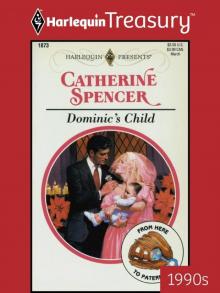 Dominic's Child
Dominic's Child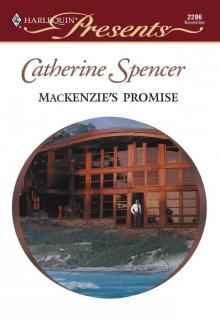 MacKenzie's Promise
MacKenzie's Promise The Moretti Marriage
The Moretti Marriage The Italian s Convenient Wife
The Italian s Convenient Wife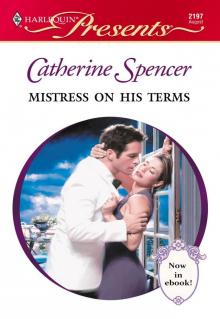 Mistress on His Terms
Mistress on His Terms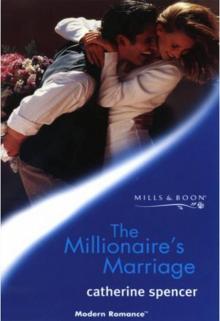 The Millionaire's Marriage
The Millionaire's Marriage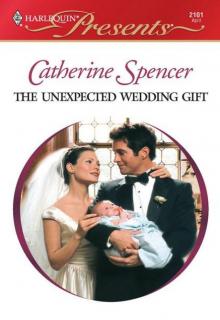 The Unexpected Wedding Gift
The Unexpected Wedding Gift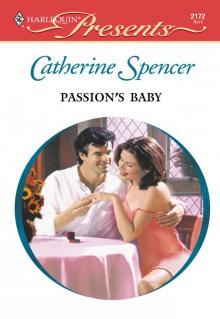 Passion's Baby
Passion's Baby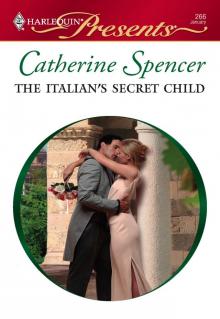 The Italian's Secret Child
The Italian's Secret Child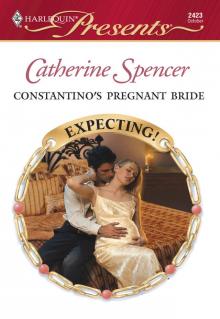 Constantino's Pregnant Bride
Constantino's Pregnant Bride The Pregnant Bride
The Pregnant Bride Christmas With A Stranger_Forbidden
Christmas With A Stranger_Forbidden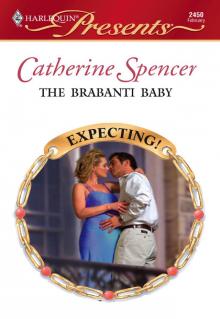 The Brabanti Baby
The Brabanti Baby Convenient Brides
Convenient Brides The Italian Doctor’s Mistress
The Italian Doctor’s Mistress The Secret Daughter
The Secret Daughter The Costanzo Baby Secret
The Costanzo Baby Secret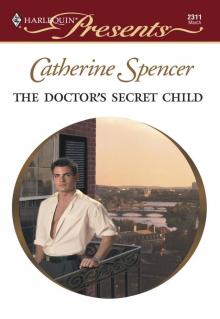 The Doctor's Secret Child
The Doctor's Secret Child A Nanny in the Family
A Nanny in the Family D'Alessandro's Child
D'Alessandro's Child In the Best Man's Bed
In the Best Man's Bed